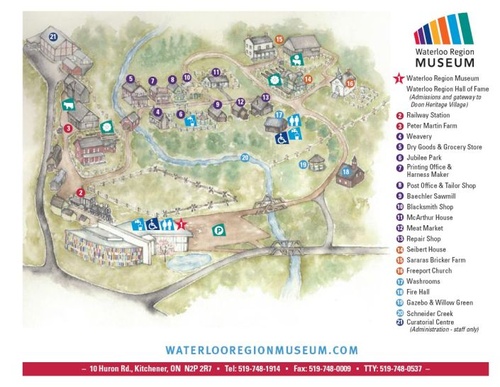Main Telephone Number: 519-748-1914
Museum Gift Shop: 519-748-1914 ext. 3924
Fax: 519-748-0009
TTY - Telephone Device for the Deaf: 519-575-4608
Mailing Address
Waterloo Region Museum
10 Huron rd.
Kitchener, ON, N2P 2R7
Canada
General Emailbox
Artifact Donations
Contact Tom Reitz, Manager/Curator at [email protected]
or 519-748-1914 ext. 3270.
Waterloo Region Museum is the gateway to Doon Heritage Village. The living history village is now open daily from 9:30 a.m. to 5 p.m. One admission price includes entry to the museum exhibit galleries and Doon Heritage Village. The village is open seasonally from May to December. Doon Heritage Village is a beautiful and engaging 60 acre living history village that shows visitors what life was like in the year 1914. The village comes to life with knowledgeable interpreters dressed in authentic 1914 clothing and features historic buildings, farm animals and fun activities the whole family will enjoy.
In the settlement of Waterloo County, many small villages developed at the intersection of two roads. These crossroads became a natural point at which trades and services developed to serve the surrounding farm community. Tied to the land and the seasonal activities of farming, the rural community represented stability and continuity.
The early 20th century saw an enormous growth in Canada's population with the influx of immigrants. Berlin, the centre of county government, grew from 9,700 in 1900 to more than 15,000 by 1912 when it became a city. Toronto, the provincial capital, grew from 209,000 to more than 380,000.
People from many parts of the world arrived on Canada's shores. Most people from Great Britain and Europe were welcomed. And yet at the same time, some people were denied entry into the country due to restrictive immigration policies.
Canada's western provinces were being settled. Large eastern cities were booming, but not without social and economic problems. Infant mortality rates were high. Typhoid fever, smallpox and diphtheria were a constant fear. Sweat-shops, child labour and poverty were common.
Rural Waterloo County could not escape the changes that swirled around it. The stability of the rural community was being challenged.
Telephones, newspapers and telegraphs now meant that current world events, political decisions, and the latest sports scores were topics of conversation on village streets. As well, extensive rail service and an improved mail system resulted in the newest fashions and household items, as seen in mail order catalogues, appearing in rural homes.
Although horses were still the main form of power on the farm, the introduction of electricity combined with the use of steam and gasoline engines made it possible for more work to be accomplished by one individual in a shorter amount of time. Labour saving devices allowed a larger segment of rural society to pursue a variety of leisure activities from hockey to music.
August 1914 and the start of World War I brought the impact of the changing world into the rural community. The outside world was no longer a foreign place. It was known; it was personal. The rural community, like the larger community around it, could no longer be isolated from world events.
Doon Heritage Village features farm animals on a seasonal basis from May through September. Local farmers supply our animals through Rare Breeds Canada, a not-for-profit organization that promotes the conservation of endangered breeds of domestic livestock and poultry.
Please note only trained staff are allowed to feed the farm animals. When visiting please do not feed or touch any animals for your own safety.
Related Page




